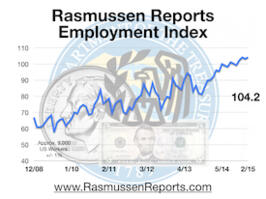To See Where Country is Heading, Ignore Washington
A Commentary by Scott Rasmussen
It's no secret that both political parties are struggling to connect with voters. Strategists dream up marketing plans to increase their party's appeal to this constituency or that group. Sometimes they work, and sometimes they don't. But they never establish a deep and lasting connection with voters.
That's because most of what the parties talk about is yesterday's news and is largely irrelevant to the realities of the 21st century.
Consider the top issue before the nation -- the economy. President Obama wants to raise taxes and increase government spending to boost the economy and create jobs. Republicans disagree. Voters root for their political team but see little connection between rhetoric and reality.
A better understanding of where the economy is headed comes from far outside of official Washington. One way to get a sense of what is taking place is to pick up a copy of "Makers: The New Industrial Revolution" by Wired magazine editor Chris Anderson.
If you've never heard of or seen 3-D printing, the book will change everything you think you know about economics and day-to-day life. Anderson argues that "the collective potential of a million garage tinkerers and enthusiasts is about to be unleashed, driving a resurgence of American manufacturing."
If you are familiar with the potential of 3-D printing, you will have to consider Anderson's claim that "a generation of 'Makers' using the Web's innovation model will help drive the next big wave in the global economy."
It's unlikely that everything Anderson describes will play out as he envisions, but at least he's discussing the 21st century economy. He is addressing both the hopes and fears of millions who recognize that the new technology has already changed the economy in a fundamental way.
Jaron Lanier, the father of virtual reality, also addressed those issues in his book, "Who Owns the Future?" Lanier initially thought that the digital networking world would improve life for everyone. Now, he fears that those networks will eliminate middle class jobs. In Lanier's view, the problem is that everybody is giving away so much personal and professional content for free. He sees the ultimate winner in such a world as the person with the biggest computer to mine that data.
As with Anderson, you don't have to agree with everything Lanier says to recognize that he's addressing reality far more than either political party in Washington.
Even more, whether Anderson and Lanier have it right, the forces they describe are going to do more to shape the global economic future than all the rhetoric about fiscal policy, stimulus, minimum wage, union rules and regulation.
For those activists who cling to the view that politics drives the future, consider the 1970s, when politicians grappled with an energy crisis, Watergate, high inflation, high unemployment and more. The policy debates led to the tax revolt and the election of Ronald Reagan as president.
During that time, unknown to the world at large, Bill Gates dropped out of Harvard to found Microsoft. Steve Jobs left school to work for Atari and attended the Homebrew Computer Club with Steve Wozniak. Those two men started Apple Computer.
Without taking anything away from Reagan's accomplishments in the 1980s, it was Gates and Jobs who shaped the future.
Today, the future is being shaped in America, not Washington.
To find out more about Scott Rasmussen, and read features by other Creators writers and cartoonists, visit www.creators.com.
COPYRIGHT 2013 SCOTT RASMUSSEN
DISTRIBUTED BY CREATORS.COM
See Other Political Commentaries.
See Other Commentaries by Scott Rasmussen
Rasmussen Reports is a media company specializing in the collection, publication and distribution of public opinion information.
We conduct public opinion polls on a variety of topics to inform our audience on events in the news and other topics of interest. To ensure editorial control and independence, we pay for the polls ourselves and generate revenue through the sale of subscriptions, sponsorships, and advertising. Nightly polling on politics, business and lifestyle topics provides the content to update the Rasmussen Reports web site many times each day. If it's in the news, it's in our polls. Additionally, the data drives a daily update newsletter and various media outlets across the country.
Some information, including the Rasmussen Reports daily Presidential Tracking Poll and commentaries are available for free to the general public. Subscriptions are available for $4.95 a month or 34.95 a year that provide subscribers with exclusive access to more than 20 stories per week on upcoming elections, consumer confidence, and issues that affect us all. For those who are really into the numbers, Platinum Members can review demographic crosstabs and a full history of our data.
To learn more about our methodology, click here.



